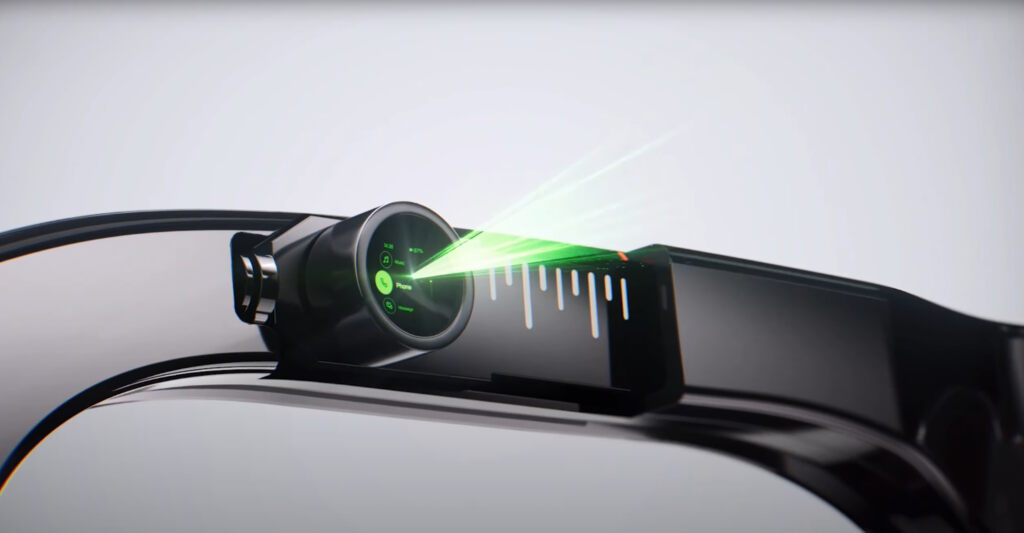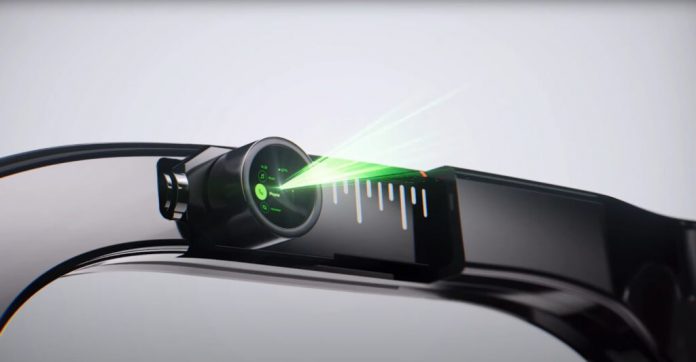At CES 2025, Halliday, a Shenzhen-based startup specializing in wearable technology, unveiled its flagship smart glasses, signaling a bold entry into the competitive wearables market.
Featuring an invisible display system called DigiWindow and a proactive AI assistant, the glasses are positioned as an innovative solution that balances privacy, functionality, and style. Halliday revives Google’s approach of the discontinued Google Glass wearables that utilized a prism-based optical system to project a small virtual screen visible to the user.
Priced between $399 and $499, Halliday’s glasses directly challenge competitors like Meta and Baidu while carving a niche with a privacy-first design. Shipping is expected to begin by the end of Q1 2025, targeting tech enthusiasts and professionals looking for intuitive and discreet wearable solutions.
A New Frontier in Smart Glass Displays
The standout feature of Halliday’s glasses is DigiWindow, a near-eye projection module that delivers a 3.5-inch virtual screen directly into the user’s field of vision. Unlike waveguide lenses used by Meta’s Ray-Ban glasses, DigiWindow eliminates common visual distortions such as rainbow patterns and light leakage, ensuring a clear and unobstructed display even in bright environments.


The glasses weigh only 35 grams—nearly half the weight of comparable devices—and offer eight hours of battery life. They support both prescription and non-prescription lenses, making them versatile for a wide range of users.
“Our goal was to create a display system that blends seamlessly into everyday life, enhancing the user’s experience without becoming a distraction,” Halliday stated.
This innovation addresses a common issue in wearable technology: ensuring functionality without compromising aesthetics or comfort.
Proactive AI: Beyond Conventional Assistance
Halliday’s glasses also feature a proactive AI assistant designed to anticipate user needs. Unlike traditional systems that rely on voice prompts, Halliday’s AI uses contextual analysis to offer real-time insights. For example, the glasses can summarize meeting discussions, generate actionable notes, or discreetly display navigation directions.
“The proactive AI isn’t just reactive; it actively works to enhance productivity and simplify tasks,” the company explained.
This sets Halliday apart from competitors like Meta, whose Ray-Ban glasses focus on object recognition and translation, or Baidu’s Xiaodu glasses, which emphasize affordability and basic functionality.
Competitors in the Wearables Market
Halliday’s CES debut comes as the smart glasses industry intensifies with advancements from established players and emerging startups:
- Meta’s Ray-Ban Glasses: Meta plans to integrate displays into its Ray-Ban line by 2025, focusing on AI notifications and gradual AR enhancements. However, privacy concerns remain a challenge for Meta, particularly after the October 2024 “I-XRAY” demonstration by Harvard researchers revealed vulnerabilities in its recording features.
- Baidu’s Xiaodu Glasses: Launched in November 2024, these glasses combine features like calorie estimation and live translations with a competitive price point under $290. Powered by Baidu’s Ernie language model, they target cost-conscious consumers in China and beyond.
- Solos AirGo Vision: Released in December 2024, these glasses prioritize privacy with modular frames that allow users to detach cameras entirely. Priced at $299, Solos positions itself as a privacy-first alternative to Meta and Baidu.
Halliday’s approach of combining proactive AI with a camera-free design directly addresses concerns raised by incidents like “I-XRAY,” making it a compelling choice for privacy-conscious users.
Balancing Privacy and Technology
Unlike competitors that incorporate cameras, Halliday has deliberately avoided this feature, emphasizing user privacy. The glasses’ AI assistant activates only through manual commands, ensuring that no data is collected or shared without the user’s consent.
“This isn’t about recording your surroundings; it’s about enhancing how you engage with them,” Halliday noted during its CES presentation.
This focus on privacy aligns with growing consumer demand for ethical technology, particularly in wearables where data security is paramount.
Practical Design
In addition to its technical features, Halliday’s glasses are designed with aesthetics in mind. Available in matte black and tortoiseshell, they offer a retro-inspired look that complements their modern functionality. The lightweight design ensures comfort for all-day use, appealing to users who value both style and performance.
Halliday’s debut reflects a broader shift toward privacy-focused, AI-driven devices. Competitors like Apple and Samsung are exploring similar trends, with Apple’s “Atlas” project emphasizing user testing and Samsung’s Project Moohan set to launch in 2025.
Halliday’s DigiWindow and proactive AI position the company as an ambitious player in this space, offering a unique alternative to more established brands. With its CES launch, Halliday signals that the future of wearable technology lies in enhancing user experience while respecting privacy.

